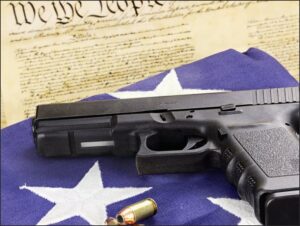After each mass shooting there is an outcry for Congress to do something. In 2021, there were almost 21,000 murders involving guns and almost 700 mass shootings (those involving four or more victims).
There has been no responsible action at the Federal level because Congress seems more interested in political food fights then in taking action that can make a difference. Henry Clay once observed that politics is not about ideology; it’s about governing, and if you can’t compromise you can’t govern. Congress in the existing political environment can only compromise by accident.
The fact that Congress is paralyzed is no reason for states to avoid taking action. In the last few years, the Virginia General Assembly has passed several gun laws. These laws, which created a backlash in a number of counties, imposed universal background checks on gun sales, created extreme risk protective orders that allow authorities to temporarily seize guns from people deemed dangerous, required gun owners to report lost or stolen firearms, restored the former one-handgun-a-month law and boosted penalties for leaving guns accessible to children.
While the Virginia laws are a step forward, they are hardly sufficient. Seven states and the District of Columbia have banned assault weapons, which demonstrates that such laws do not violate the Second Amendment. Virginia should do likewise. Why does anyone need an AR-15 or high capacity magazine like the ones used in Uvalde Texas? There are only a few reasons for owning guns: target practice, hunting, and self-defense. None of those reasons justify assault style weapons, although the NRA and gun manufacturers try to create a justification.
Automatic weapons have already been banned since 1986. Machine guns have been banned since the 1930s and in 1986 President Reagan signed the Firearm Owners Protection Act, which made the sale of fully-automatic firearms manufactured before that year illegal. Owning the ones that still exist is legal, just exceptionally difficult and very expensive. Banning these weapons isn’t about infringing rights, it’s about limiting the carnage caused by emotionally disturbed individuals who have easy access to assault weapons.
A few states require firearm registration, which according to many legal scholars does not conflict with the Second Amendment.
A registration requirement could serve several worthwhile purposes. First, it represents an implicit cooling-off period for those who would use a gun as an outlet for their anger or need to retaliate for some perceived injustice. It wouldn’t prevent such shootings but it might reduce them. Second, registration could be made a requirement to purchase ammunition. This is a way to get unregistered firearms into the system.
There is a big debate about shootings and mental health. In the book Gun Violence and Mental Illness, psychiatrists Liza Gold and Robert Simon summarize the evidence challenging the view that mental illness is a leading cause of gun violence. According to them, fewer than 5% of shootings are committed by people with a diagnosable mental illness. They contend that “the link between mental illness and mass shooting exists in our minds, not in reality.” Clearly this conclusion hinges on what is meant by “mentally ill” and the accuracy of diagnostic tools.
According to a recent article in Time, the evidence suggests that most mass shooters are, “people who have reached their breaking point” because something is overwhelming their ability to cope. And mass shooters don’t think that they will get away with their act of violence. Either they take their own lives, law enforcement takes them, or they spend the rest of their lives in prison. Clearly, perpetrators of mass shootings have serious but undiagnosed emotional problems even if the mental health community can’t recognize them.
When someone is at the end-of-life breaking point, he (since all mass shootings are by males) is facing an emotional/mental crisis. Hence, only crisis intervention tools offer hope. But how do we, ex-ante, identify the need for and get the needed help? Spending a lot more money on mental health won’t solve that problem until it is more clearly defined and better intervention strategies are in place, especially since the mental health community denies that mass shooting perpetrators have mental problems.
Steps to limit access to assault rifles and other high capacity weapons, registration, background checks, and related measures represent challenging political actions. But that might be the best that can be done until we have a better system of crisis identification and intervention.
Addressing mass shootings and murders with guns is a problem where the best should not be the enemy of the better. Steps in the right direction will save lives.
William O’Keefe, a Midlothian resident, is founder of Solutions Consulting and former EVP of the American Petroleum Institute.


Leave a Reply
You must be logged in to post a comment.